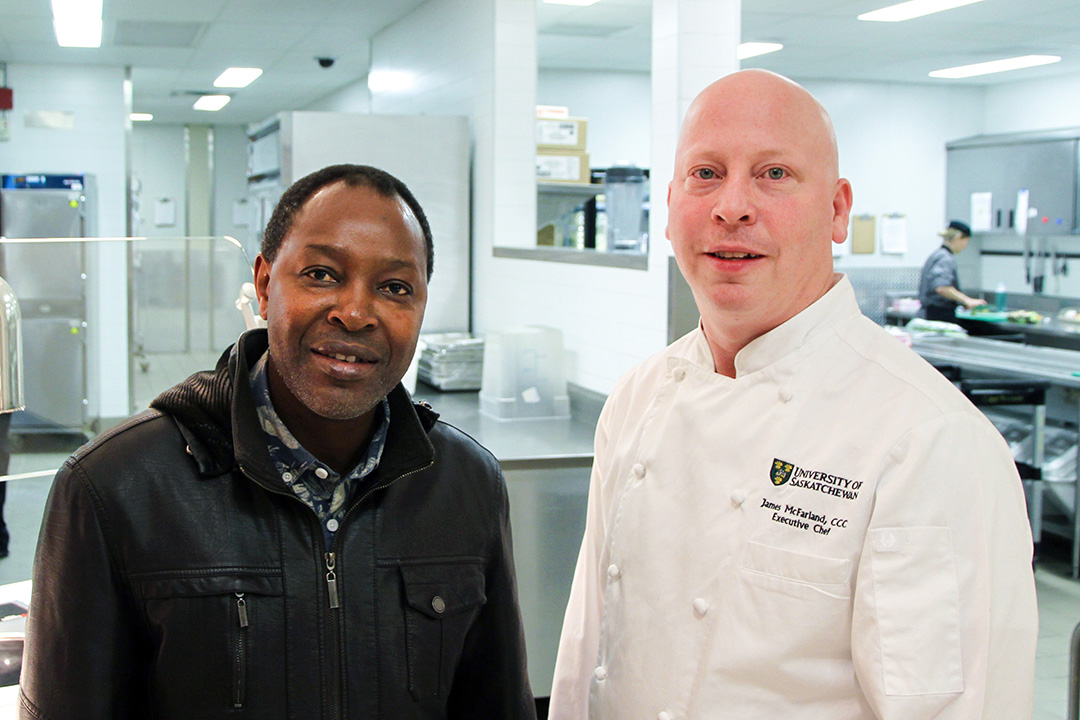
Campus compost collaboration
Call it a campus collaboration that’s truly come full circle.
By Chris MorinWhen University of Saskatchewan (USask) Grounds Manager Gift Marufu first became involved in a food waste dehydrator project to champion campus sustainability, he never dreamed how deep the partnerships would run.
The new dehydrator, located at Marquis Hall, is able to divert up to 650 pounds of food waste from the landfill every day by creating a semi-composted material that is being put to use elsewhere on campus.
“We already have a vibrant composting program on campus, where we collect leaves and grass clippings and materials from greenhouses and are producing about 2000 yards of compost annually,” said Marufu. “But the dehydrator adds to this by taking our food waste and transforming it into a nutrient-rich material that’s great for plant growth. This composted material is then distributed to our community gardens and the flower beds located in the Bowl. We are also using this compost instead of conventional fertilizers in areas such as the Huskies soccer fields.”
And while this is good news for the grounds crew, it all starts with the kitchen, dish room and custodial staff, who are responsible for separating the compostable and non-compostable waste and bringing it to the dehydrator, according to Culinary Services Assistant Director and Executive Chef James McFarland.
“Through best practices, we try to avoid or reduce food waste before it even comes to the machine, however there is always a margin of waste in a food service operation including peelings from vegetables,” he said. “The composting initiative has involved changing habits in the kitchen with staff using compost bins, which we now have more of than garbage bins. It’s a group effort and it takes everyone’s regular attention to ensure it’s successful. Having access to this dehydrator and understanding the benefits has been a great learning experience and the staff have been great in supporting this.”
According to Marufu, this piece of composting technology—the first of its kind at a Canadian university—has been a long time coming.
A more compact version of the machine was initially installed in Marquis in early 2017 as part of the demo phase, where staff worked to smooth out any initial issues. A larger, more powerful version was brought to campus in October, 2018. While there has been some work implementing the machine, from configuring electrical and plumbing, to training staff on how to use the equipment, Marufu said it’s been an investment that’s paid off in a number of ways.
“I’d say we are diverting over 4,000 pounds of food waste from landfill every week. That is significant in that there are associated costs with garbage pick-up that we no longer need to pay,” he said. “In terms of compost, we are self-sufficient now for our campus-wide needs. We don’t need to purchase this material anymore.”
There are also plans to collect the nutrient-rich water gathered during the dehydration process to use for watering the plants on campus, said Marufu.
The new dehydrator is one part of the university’s push towards campus sustainability—a priority outlined by USask President Peter Stoicheff in 2015. Having secured a silver STARS rating in 2017, the university has since created the President’s Sustainability Council, and the Office of Sustainability has ushered in a number of initiatives, including a new sustainable printing campaign that aims to save money, ink, and electricity across campus.
And with word of the project getting out, there has been plenty of positive feedback as well as interest from other areas of campus including student groups, said McFarland.
“The partnerships are a big win for us, but it’s the full circle of sustainability that’s also a big highlight,” he said.
The compost has even found its way to the rooftop gardens located at the Ag Building. This has been a true collaborative campaign, as the food grown at the gardens has similarly found its way to campus kitchens.
“We’ve worked with Dr. Grant Wood in plant sciences, and the Ground Services Department supplies the compost, which contains the food waste dehydrated here,” said Marufu. “It shows how people can work together on important issues. What a beauty to watch that happen.”

